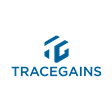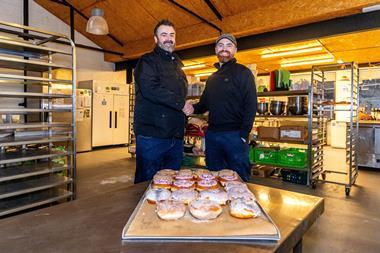With the bakery supply chain in the UK set to get tougher, TraceGains’ Denis Storey looks at the options to ensure bakers ride out the storm successfully.

It looks like things in the UK will probably get worse before they get better. As if the political turmoil hasn’t been enough, some of the country’s leading analysts expect economic headwinds to keep battering UK consumers well into the new year.
According to The Guardian, Goldman Sachs recently downgraded its UK outlook, “forecasting the UK economy would shrink by 1% next year, down from its previous estimate for a 0.4% contraction”.
“Folding in weaker growth momentum, significantly tighter financial conditions, and the higher corporation tax from next April, we downgrade our UK growth outlook further and now expect a more significant recession,” the Goldman Sachs report declared.
The news isn’t all bad

The EY ITEM Club, a leading UK forecasting group, just released its Autumn Forecast, and things look grim. The forecasters predict: “The UK economy is expected to contract around 0.2% each quarter from Q4 this year through to Q2 2023, resulting in GDP falling 0.3% in 2023 as a whole.” But a ray of hope is starting to break through.
“There’s no doubt the UK economy faces a difficult period ahead, with global headwinds adding to domestic pressures,” EY UK Chair Hywel Ball pointed out. “The silver lining is that the government’s intervention on energy bills is expected to limit the extent of the downturn, while ONS [Office of National Statistics] data suggests that households have access to a larger cushion of pandemic savings than previously thought.
“Nevertheless, there are very significant risks to the forecast, with the potential for further surprises or global instability creating additional drags on growth. Businesses will need to think very carefully about their resilience and plan for different scenarios while also being mindful of the support they provide to their customers and employees.”
In the meantime…
Companies must find a way to weather this storm before it breaks. And it doesn’t seem as if anyone is exempt. UK grocery retailer Waitrose took a 3.1% hit in sales in the third quarter, while the country’s leading supermarket chain, Tesco, has seen its stock price fall more than 20% since July.
And while British baking giant Warburtons managed to turn an operating profit in 2021 – this year’s numbers aren’t available yet – it did trend downward slightly from 2020.
“Investment is focused on enhancing our capability to meet changing consumer trends and deliver productivity,” Warburtons’ directors said in July. “This continuing innovation and investment in new capability will ensure we are well placed for future progress.”
Company leadership attributed its continued success to strategic partnerships and new product launches, including a more significant push into the gluten-free space.
Finally, Cooplands bakery chain owner, EG Group, has reported “strong performance” so far in 2022, driven mainly by its thriving foodservice business. EG Group co-founder and co-CEO Zuber Issa told British Baker that the momentum “serves to underline our belief that foodservice represents the biggest opportunity for EG Group globally”.
But that doesn’t mean the company is standing still. “The outlook for the year remains uncertain with household budgets already coming under significant inflationary pressure,” Issa added. “However, we remain confident that the geographic diversity of our business and our highly complementary operations will continue to underpin our resilience and allow us to outperform the wider market.”
So, what’s a baker to do?
Make new products (or remake existing ones)
One obvious answer is to pursue new product development (NPD), which is – admittedly – easier said than done.
Consumers worldwide are trying to get less for their money, as in less sugar, less meat, and even less gluten, which sounds counterintuitive for the baking business. Consider:
● 42% of consumers want to consume less sugar, research suggests.
● 48% of UK shoppers want to cut back on meat, British Baker reported in March. Instead, this new wave of consumers wants to try plant-based protein products and flexitarian diet offerings. For bakers, that obviously means leaning into tasty substitutes for butter, cream, and eggs.
● The European market for gluten-free baked goods is expected to grow at least 11% annually for the rest of the decade.
This isn’t to say that consumers don’t also want a little something extra in their baked goods. On the contrary, research has shown greater consumer interest in products that offer an immunity boost and other nutritional add-ons, such as higher fibre and protein.
Explore new markets
With strained relations between the UK and the European Union because of Brexit, the US has emerged as an increasingly attractive market. As a result, the US is currently one of the most significant countries for British exporters, posting 50% growth over the past decade in export sales. And while whisk(e)y remains the most popular British export with US consumers, other food and drink products have gained ground, despite the pandemic.

US consumers have fallen for croissants lately, to take one example. Based on Cypress Research’s ‘State of the Baking Industry’ study, 42% of retail bakeries now carry croissants – a higher percentage than donuts or bagels. So, the newfound love for the flaky pastries represents a golden opportunity for British bakers looking to expand their market reach.
And with the growing popularity of cereal and energy bars, there are multiple avenues of growth.
A smarter solution
No matter how much technology – and the economy – has changed the baking business, ingredients remain the basic building blocks. The continued success of food brands – particularly bakers – lives and dies on a reliable supply of ingredients that enable continuous production and meeting fickle customer demand.
However, the loss, or risk of loss, of a single ingredient can threaten the most stable supply chains.
A robust, networked intelligence solution, like TraceGains, offers brands and suppliers a complete, integrated tool that provides global visibility into ingredient-level risks that could otherwise take days or weeks to track manually.
In addition, Networked Intelligence automates the entire process, matching alerts directly to a company’s supply chain to eliminate time wasted on manual searches and overlooked warnings. Brands can also confidently explore alternate sourcing options since the system matches new suppliers.
Networked Intelligence provides a start-to-finish supply chain management solution that includes:
● Curated intelligence data – The TraceGains Global Horizon Scanning data add-on layers in data from thousands of global sources. And AI-driven matching technology maps ingredient and supplier data to each customer’s unique supply chain.
● Collaborative workspaces – Internal teams can work together effortlessly from the same set of data, supported by fully automated alerts and notifications when critical intelligence becomes available.
To find out more about the TraceGains Networked Ingredients Marketplace, contact Dan McGlynn on
+44 (0)113 868 1212 or visit www.tracegains.com




































